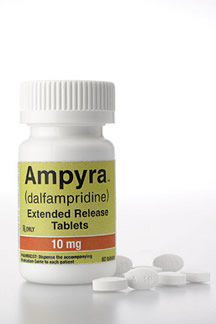
Based on postmarketing surveillance data, the US Food and Drug Administration is updating healthcare professionals on the risk for seizures in patients with multiple sclerosis (MS) who begin treatment with dalfampridine (Ampyra, Acorda Therapeutics, Inc).
Seizures are a known side effect of dalfampridine, which was approved in 2010 to improve walking in patients with MS, the FDA notes in a statement released today. However, "FDA's analysis identified postmarketing case reports of seizures associated with Ampyra at the labelled recommended dose, with many cases of seizures occurring within the first week of starting" treatment, the statement said.
FDA is also updating the dalfampridine drug label to clarify recommendations that kidney function should be assessed before treatment is started and monitored at least annually while treatment continues, even if serum creatinine levels appear to be normal. Patients who miss doses should not take extra doses, the statement adds, because this could increase seizure risk.
The "vast majority" of seizures occurred in patients with no prior history of seizures. Some patients had been taking other drugs that could have increased seizure risk or lowered the seizure threshold, the agency notes, but most patients were at least 50 years old with factors that put them at risk for mild renal impairment, the statement adds. "Potentially, age-related renal dysfunction and resultant increases in Ampyra plasma concentrations contributed to the risk of seizure," they write.
"Before starting treatment with Ampyra, renal function should be assessed," FDA notes. If creatinine clearance (CrCl) is unknown, it can be estimated using the Cockcroft-Gault equation (multiplied by 0.85 for women).
Dalfampridine should not be used in patients with a history of seizures or in those who have moderate or severe renal impairment (CrCl of 50 mL/minute or less).
Those with a CrCl between 51 and 80 mL/minute are considered to have mild renal impairment and so are at greater risk of seizures with dalfampridine because of increased plasma levels of the drug. "The potential benefits of Ampyra treatment must therefore be carefully considered against the potential risk of seizures before using Ampyra in patients with mild renal impairment."
The maximum recommended dose of dalfampridine is 10 mg taken twice daily, 12 hours apart. Tablets should be taken whole and should not be divided, crushed, chewed, or dissolved, the statement notes.
Treatment should be discontinued permanently if a seizure occurs.
Dalfampridine is marketed in Europe by Biogen Idec Inc, under the brand name Fampyra. The European Medicines Agency (EMA) Committee for Medicinal Products for Human Use issued a conditional approval for the drug in May 2011. A conditional approval, the EMA website notes, "is granted to a medicinal product that [fulfills] an unmet medical need when the benefit to public health of immediate availability outweighs the risk inherent in the fact that additional data are still required. The marketing authorization holder is likely to provide comprehensive clinical data at a later stage."
The full FDA safety communication can be found here.





 留言列表
留言列表
 線上藥物查詢
線上藥物查詢 